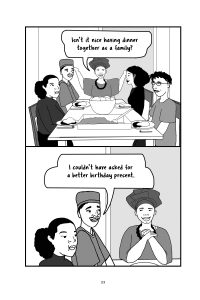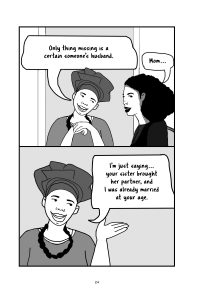Raise your hand if you feel personally victimized by fairy tales, Disney movies, and rom-coms that push the urgent narrative of finding “the one.” Now you’re an adult, frustrated by your love life, and wondering why Prince Charming hasn’t turned up at your door with your missing heel after a wild night out. While young adults today are in no rush to tie the knot, many of us are still very keen to experience a certain romanticized kind of relationship—and it’s helpful to realize that it’s not the only option available to us!
Whatever generation you are in, it’s likely you grew up on popular movies and TV shows in which couples are often two conventionally attractive people—and most often two cisgender, heterosexual white people. It’s usually the same pattern: there’s a buildup of tension between the primary characters, but they’re somehow kept apart by various factors such as busy jobs, an existing marriage, or the fear that a romance would ruin a good friendship. The idea is to convince us viewers that these two people are “soul mates.” But how many times have you witnessed a fictional couple whose relationship couldn’t possibly work due to blindingly obvious incompatibilities? Maybe at a certain point, you started to think it might not be the end of the world if they moved on and dated other people. There are so many other ways to think about dating and finding love.
Family systems also play a role in shaping idealized images of love. The earliest examples of love we are exposed to—that of our parents, grandparents, and other caregivers and adults in our childhood—teach us what to expect from our own love lives. For instance, if your parents consciously treat each other respectfully, communicate effectively during disagreements, and display romantic love in a healthy, nurturing way, they are demonstrating a positive approach to relationships that you will have learned how to replicate in your own life. In contrast, if your parents regularly display signs of incompatibility, visualizing yourself in a healthy committed relationship may not come easily.
Consider what kinds of ideas about relationships you might have if your parents have struggled to get along. Multiple studies show that the children of couples who don’t have healthy relationships are more likely to have insecure attachment styles, commitment issues, and marriages that end in divorce. In short, it’s not your fault if your love life is grim—you can blame your parents for that. The good news is that there are many useful tools to access, from therapy to podcasts and books by relationship experts and even YouTube channels and other social media pages dedicated to dating and relationship advice. We can use these tools to develop self-awareness, understand our core beliefs about love, and seek out the relationships that truly work best for us.
Despite being part of a generation that fought for the equality of women in the workforce and in intimate relationships, our parents may also have passed on beliefs about relationships that can discourage our pursuing partnerships that reflect our true selves—such as the belief that romance should only exist between cisgender, heterosexual (or “cis- het”) men and women, that women must wait for love to come to them rather than pursue it herself, or that a woman is only truly independent if she doesn’t get married. Isn’t it awesome that we now live in a time when such restrictive beliefs are being dismissed and more people are starting to realize that love looks different to everyone across the spectrum of gender and sexuality? Nonetheless, we can’t deny the effects these long-held beliefs have on our outlooks on love. And then there’s social media. For members of the first generation to grow up with social media—a space where influencers, celebrities, and even our own family and friends share all the best parts of their relationships (leaving out the mundane and difficult moments)—it’s no wonder they have developed unattainable fantasies about IRL romance.
Despite it sometimes feeling like we are living in a lovelorn era, there is an abundance of dating resources: TV shows about dating, dating how-to guides, and dating apps. In some ways dating—whomever and however one chooses—is more accessible now than ever. We are “Generation Tinder,” with thousands of profiles of prospective partners always at our disposal. So why is it so hard to actually date someone?
Imagine if we could take control of our love lives and go after what we want without the hang-ups and limitations that come with the prescribed gender roles and ideas of how love stories should unfold that are so foundational to contemporary dating culture. Believe it or not, it’s possible! Dating in this millennium starts with deconstructing your ideas about love, getting to know your positive qualities and your flaws, and accepting that off-screen relationships require compatibility and self-awareness to thrive. And recognizing that feeling loved, desirable, and worthy isn’t exclusive to romantic partnerships. We also have to learn how to make the first move and get cozy with the reality of disappointment and rejection. Oh, and enjoy being single while we’re at it!
Nothing too difficult, right?
No one is allowed to pressure you to stay single or pursue love.



Excerpted from Why You’ll Never Find the One: And Why It Doesn’t Matter by Sarah Akinterinwa. Published by PA Press, an imprint of Chronicle Books. Copyright © 2023 by Sarah Akinterinwa.
Why You’ll Never Find the One is available from Amazon and Bookshop.
